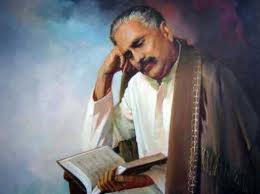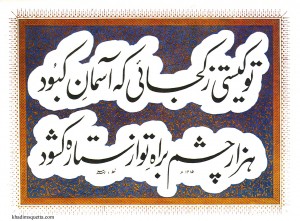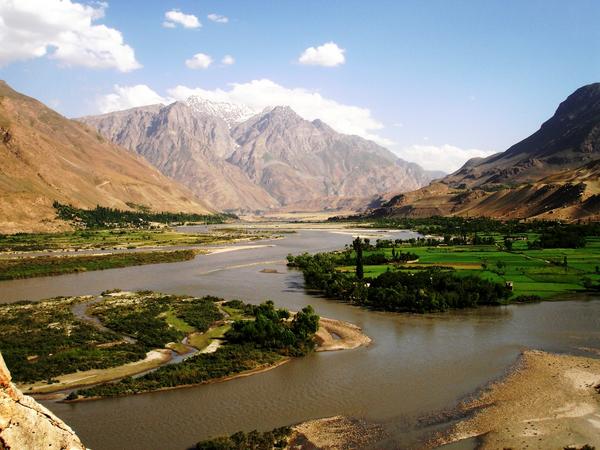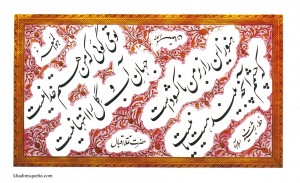
“If you want to understand how Afghanistan was in the past, how its present condition is and how it would be in the future, read Alama Iqbaal’s views and poetry.”
While hearing this recommendation from instructors, I was astonished, how a man is capable of having such understanding of past, present and future of a country?
Well, it was the time when I had little knowledge of this great man’s poetry. But rafta-rafta when I deeply started studying his poems, thoughts and life style, I found out that it is really a human speaking about the past of a nation remarkably, unveiling its present thoughtfully and talking about its unknown future miraculously and marvelously. Definitely, this is Iqbal having such intellectuality to distinguish the pearl in depth of the seas, delineate it uniquely, beautify it with wisdom of words which is finally called “kalam-I-Iqbal”
Well, I have searched and translated some information about him from various sources, and would like to share it with his real enthusiasts here.

Alama Muhammad Iqbal, who is known as “Iqbal Lahori” in Afghanistan and Iran, was born in Sialkut in 1873. His father Shaikh Noor Muhammad was famous for his devotion to Islam and raised his children with deep religion grounding.
Alama Muhammad Iqbal is known as the thinker of Pakistan “, Muffakkir-e-Pakistan”, the poet of the East “Shaair-e-Mashriq”, the sage of the Ummah “Hakeem-ul-Ummat”, and officially recognized as the national poet of Pakistan.
His fore fathers were said to be related to Kashmir who became Muslim in 17th century. Where as according to some sources his fore fathers were belonged to Paghman of Kabul.
As far as his education and studies are concerned, he learned holy Quran in a mosque of Sialkut. College in Lahore where he studied philosophy, English literature and Arabic. He won a gold medal for topping his examination in philosophy.
“In India he is widely regarded for the patriotic song (sari jahan si acha…), in Afghanistan and Iran where he is known as Iqbal Lahori, is highly regarded for his Dari/ Farsi works. “
Afghanistan from the pen of Iqbal:

In his first visit to Afghanistan, Iqbal presented his book “Pyam i Mashriq” to king Amanullah Khan in which he admired the liberal movement of Afghanistan against the British Empire. In 1933, he was officially invited to Afghanistan to join the meeting regarding the establishment of Kabul University.
Alama iqbal has visited many places in Afghanistan and has written a complete poetry collection “ Musafir” which is about Afghanistan and Afghans, where he talks about the historical places as “ Kharqa i Mubarak, shrine of Sanayee Ghaznavi, Mahmud Ghaznavi, Ahmad Shah Durani etc.”
In praise to Kabul, for example, he says:
Shahr i Kabul khitai janat nazir….. aab haiwan az rag taak ash bigeer
Which means: the city of Kabul is a land, like paradise… its grapes may provide you “aab hayat”.
He has another poem titled “khitab ba aqwam sarhad” where he says:
“O you who are hidden and lost in ignorance, find yourself…being in cover (ignorance) is unlawful in Islam… what is religion? Finding the secret of Self… your life will be as death unless you find yourself”
And in infinite love to Afghanistan, he says:
Asia yak paikar aab o gil ast… milat I Afghan dar en paikar dil ast
Dar fisad aw fisad Asia … waz gishad aw gishad Asia
آسیا یک پیکر آب و گل است
ملت افغان در آن پیکر دل است
از گشاد او گشاد آسیا
وز فساد او فساد آسیا
Which means: Asia is a living body, and Afghanistan is its heart In the ruin of the heart lies the ruin of the body So long as the heart is free, the body remains free If not, it becomes a straw adrift on the wind. Mohd. Iqbal 1876-1938
(1914-1915) is called the reborn date of Alama Iqbal, which is equivalent to the publishing of “Sirajul Akhbar Afghania” that was the most popular publication of Central Asian freedom fighters. It was a strong weapon against expansionists. Therefore, later it was banned in India and the readers of it were being punished and charged in central Asia.
Iqbal intended a cultural revolution, and he thought it necessary for eastern countries to be equipped by modern education and technologies. His thoughts, infact were the continuation of thoughts of Alama said Jamaluddin Afghani. According to Allama Mahmud Tarzi, said Jamaluddin was mine of Irfan (knowledge) from which every body, has taken out advantages based on his own talent and sense. Iqbal too getting education in Great Britain and Germany got familiar to said Jamaluddin’s thoughts and gained advantages from the mine and treasure of his knowledge. As, it’s said: “said Jamaluddin Afghani paced the way, whereas Alama Iqbal flattened that way.”
Iqbal as a Dari Poet:

(Gar chi Hindi dar uzubat shakar ast… tarzi guftaar dari shireen tar ast)
Means: even though in sweetness Urdu (Hindi) is sugar, but Dari is sweeter than that.
Iqbal’s poetic works are written mostly in Dari rather than Urdu. Among his 12000 verses of poems, about 7000 verses are written in Dari, and from 15 of his collection 12 of them are in Dari language.
In 1915, he issued his first collection of poetry, the Israr-i-Khudi (secret of self) in Dari language.
The love of Dari language has touched Iqbal’s heart in such extend as he speaks of creature of Marikh (Marc) aalam-i-hikmat, as Dari speakers. As he says:
He highly praises Dari poets as Hakim Saniyee, Mawlana Rumi Balkhi and others.
The poetry of Jalaluddin Muhammad Balkhi Rumi bore the deepest influence on Iqbal’s mind. Deeply grounded in religion since childhood, iqbal would begin intensely concentrating on the study of Islam, the culture and history of Islamic civilization and political feature Muhammad Balkhi Rumi in the role of a guide in many of his poems.
Iqbal’s first book was “ Nala-i-yateem” which was published in 1899, also he has written” Economics” which is the first economic book in Urdu. History of India and Baang-i-Dara are too among his written books. Whereas his famous books written in Dari language are: Israr-i-khudi, Payam-i-Mashriq, Zabur-i-Ajam, Rumuz-e-Bekhudi, jawed Nama, Pas chi Bayad kar Ay Qawm Sharq.
Iqbal was very much interested in classic and modern cultural period of Afghanistan due to this he in his poems and books admired Afghanistan in a way that if a person without recognizing that he is from Pakistan, read his Dari poems, will surely consider him from Afghanistan.
Beside his ideology and thought of Islamic world, one of the causes of his being liked by Afghan scholars, is his special interest to Afghanistan and people of this land.
Finally, this great Dari poet has bid farewell to the world in 21 of April 1938.
The Afghani marble by which his grave is decorated shows clearly deep love of Afghans to him. As every year his death anniversary is held by Pakistan embassy in Afghanistan with an active participation of instructors of Dari Literature Department of Kabul University.
Iqbal is among those precious and extraordinary characters that world would not be able to produce him again ever. May God bless him and grant him paradise.



